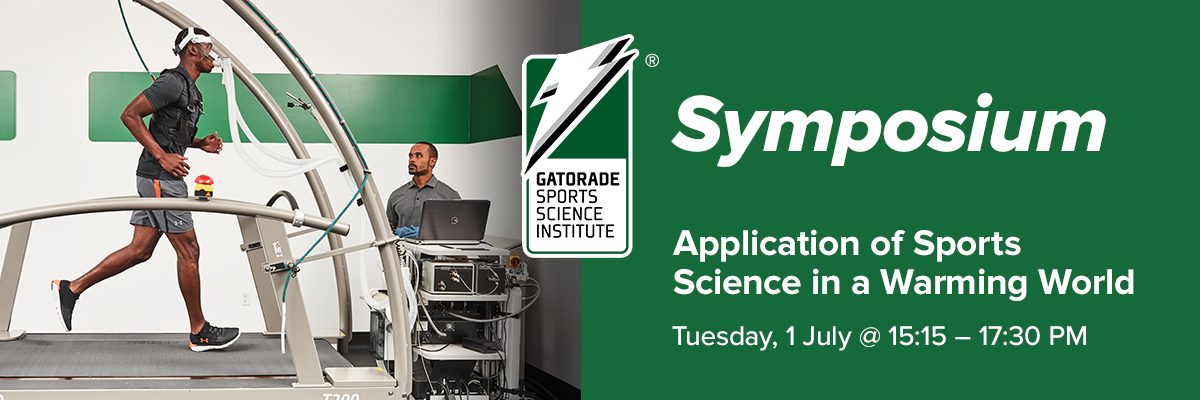
The GSSI symposium “Application of Sports Science in a Warming World” brings together leading experts to explore how sports science is addressing the challenges posed by increasing global temperatures. As the world continues to warm, athletes, workers, and the general population face new physical demands that require innovative solutions.
Prof. Jason Lee will present on “Human Health and Potential in a Warming World,” examining the impacts of extreme heat on human health, well-being, and performance. Prof. Lee will emphasize the effects of heat stress are multifaceted, requiring a comprehensive, multidisciplinary approach to address. Prof. Lee will discuss both the physiological mechanisms and corresponding recommendations that extend beyond sport to broader societal needs.
Dr. Margaret Morrissey will address “Application of Sport Science to occupational Heat Stress,” exploring how sports science principles can be adapted to improve worker safety and performance in hot environments. As heat stress becomes a more significant concern in many labor-intensive industries, Dr. Morrissey will highlight the intersection of sports science and occupational health, offering actionable insights on mitigating risks through acclimatization, cooling strategies, and practical interventions.
Finally, Prof. Yannis Pitsiladis will focus on “Wearable and Telemedicine Innovations in Elite Sport: Leveraging Big Data and AI,” detailing how emerging technologies are revolutionizing performance monitoring and the impact of heat demands in elite athletes. Prof. Pitsiladis will discuss the role of wearable devices and telemedicine in collecting real-time data, offering personalized insights that can be applied to elite athletes and wider sporting community.
These presentations will provide an overview of how sports science is evolving to meet the challenges of a warming world. A panel question and answer session will follow to discuss those strategies and technologies that can benefit both athletic performance and public health.
Date: Tuesday, 1 July
Time: 15:15 - 17:30
Session room: Anfiteatro
Chair
Dr Ian Rollo
Principal Scientist
Gatorade Sports Science Institute
Leicester, United Kingdom
Read CV
Speakers

Prof Jason Lee
National University of Singapore
Singapore
Read CV
Human Health and Potential in a Warming World
Heat stress poses significant risks to health, productivity, and decision-making. Heat-related illnesses, cardiovascular strain, dehydration, and electrolyte imbalances are common health impacts. Effective strategies include physical conditioning, heat acclimatisation, monitoring weather forecasts, scheduling breaks, cooling and hydration. By taking proactive measures, we can create safer, healthier, and more productive work environments, ultimately heatproofing humans in this warming world.

Dr Margaret Morrissey
Providence College
Providence, RI, USA
Read CV
Application of Sport Science to Occupational Heat Stress
The science gathered from years of research on athletes has numerous applications that can help us better understand and support laborers who must engage in intense exercise under high heat conditions. However, these applications have limitations because the workforce often includes a wide range of ages, many medical comorbidities, prescription medications, long work shifts, limited access to onsite safety professionals, and frequently absent medical care. Understanding how we can build upon our existing knowledge in the athlete space and carefully apply and expand this information to effectively assist laborers in coping with heat will be one of exercise science's next major challenges in the coming decades. The presentation will explore heat's acute and chronic effects on worker physiology, health, safety, and productivity. Additionally, the presentation will provide an in-depth analysis of prevention strategies, including hydration, to mitigate the adverse impacts of heat. Lastly, the presentation will underscore critical research gaps, including the need for normative data on sweat rates and electrolyte loss in workers, which hinder the development of effective interventions.

Prof Yannis Pitsiladis
Hong Kong Baptist University
Hong Kong, China
Read CV
Wearable and Telemedicine Innovations in Elite Sport: Leveraging Big Data and AI
Wearable sensor technologies, powered by AI and big data, are transforming elite sport by enabling real-time monitoring, analysis, and transmission of biometric data. These innovations are enhancing athletic performance, protecting athlete health, and redefining sports medicine. Following successful trials at major events such as at the Paris 2024 Olympics and Paralympics, attention now turns to upcoming events such as the National Games of China, Milano-Cortina 2026 Winter Olympics, and LA 2028 Summer Olympics, where cutting-edge wearables will continue to shape the future of sport.
Such events mark an era where academia and industry collaborate to integrate real-time wearables in high-stakes competition, particularly in extreme conditions. However, challenges persist, including limited scientific validation of key metrics, hardware reliability, data security, information overload, and regulatory adaptation. Real-time data could also necessitate immediate medical interventions, raising ethical concerns regarding athlete safety and autonomy.
To fully harness wearable technologies, evidence-based standards must be established, data protection measures strengthened, and sporting regulations modernized. Looking forward, the convergence of AI, big data, and wearables presents unprecedented opportunities to optimize training, mitigate injury risk, and personalize health interventions. By addressing current limitations, sport and exercise science can lead the way in utilizing these innovations, not only for elite athletes but also for broader applications in global health, wellness, and disease prevention.
